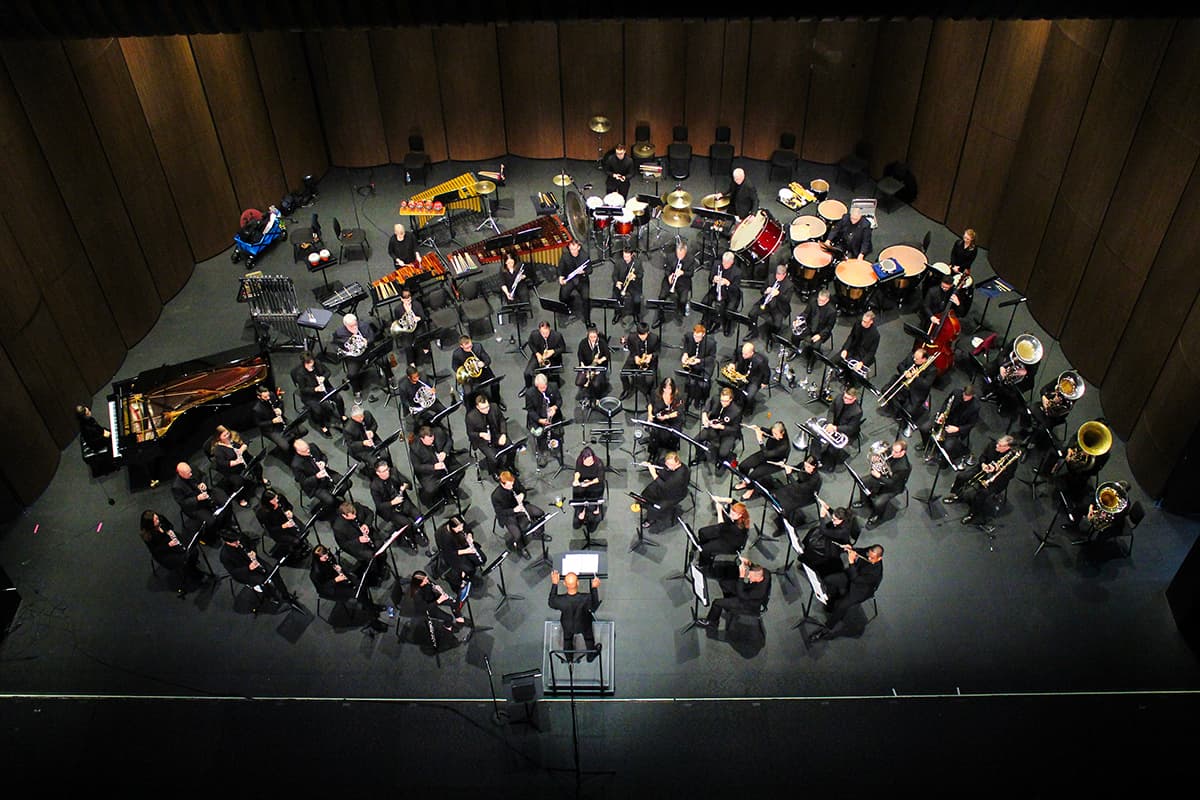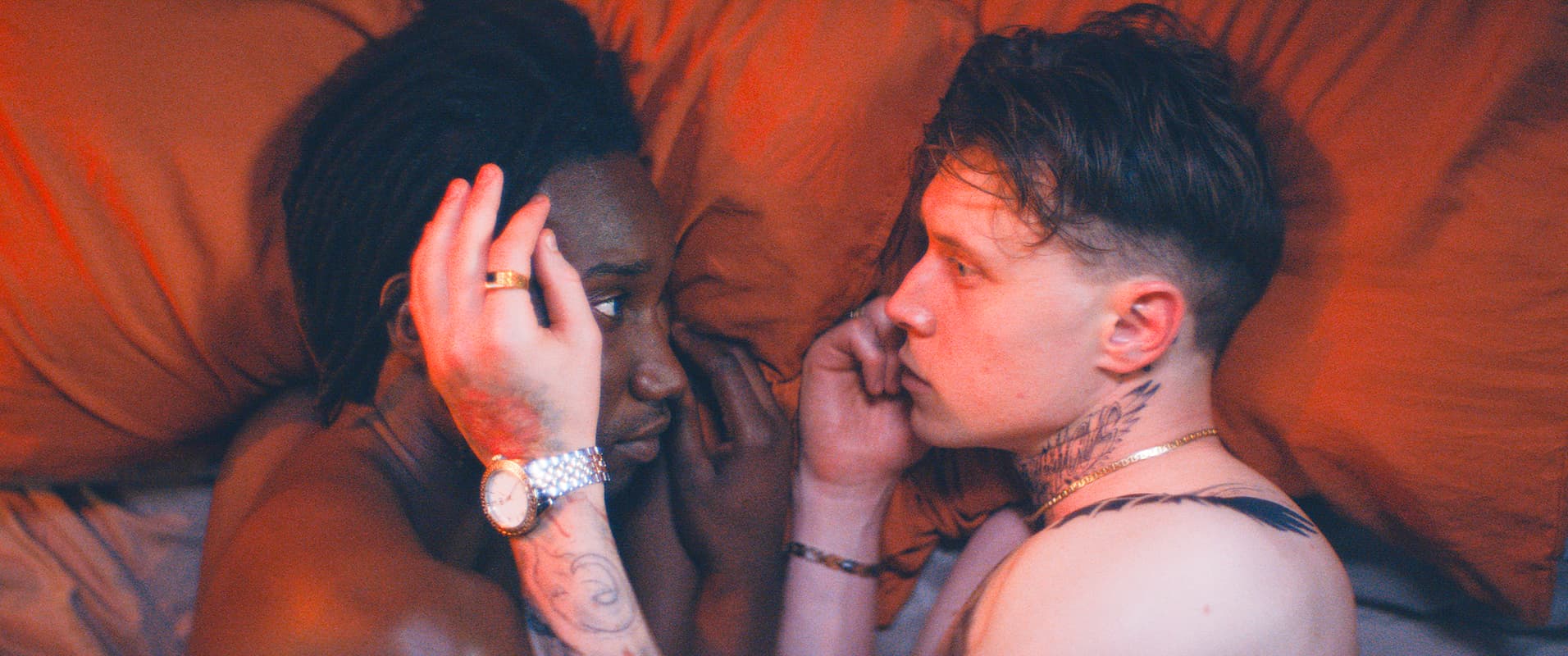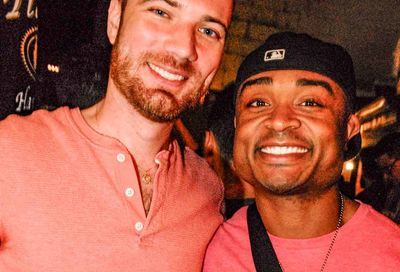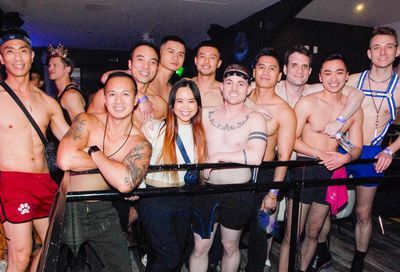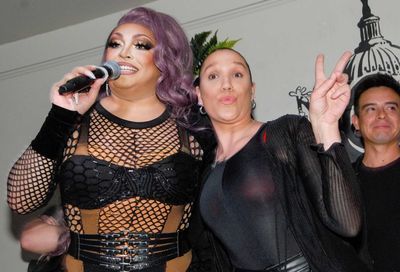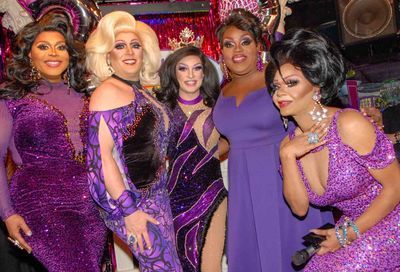Tragedy in the Ring: “Champion” mixes jazz, opera and sexuality
In Terence Blanchard's stylized, jazz-infused Champion, a boxer struggles to come to grips with his sexuality with operatically devastating results.

American baritone Aubrey Allicock — slated to make his Kennedy Center debut this week as Emile Griffith in Washington National Opera’s premiere production of Terence Blanchard and Michael Cristofer’s Champion — is steady, ready and in fighting shape for his return to a role he originated in this modern opera. He’s feeling inspired to be appearing in “a story that needs to be told.”
For Allicock, reprising the part, alongside famed mezzo-soprano and D.C. native Denyce Graves (also returning to a role she originated), offers a liberating opportunity, now that the piece has legs, “to delve into the nuances and really make bigger points and gestures.” Boasting a score by five-time Grammy-winning composer, musician, and bandleader Blanchard, and a libretto by Pulitzer Prize-winning gay writer and actor Cristofer, this “Opera in Jazz,” as Blanchard dubbed his first foray into the form, is in itself a grand gesture: a stylized, thought-provoking, emotional portrait of the bisexual black boxer who accidentally killed an opponent in the ring.
Champion boxer Emile Griffith had fought Benny “The Kid” Paret twice in the ring before their final, tragic bout at Madison Square Garden on March 24, 1962. In Griffith and Paret’s two previous contests, they had traded victories, with Paret entering their final match holding the welterweight belt that six months prior he’d won back from Griffith, who had taken the title by knockout in their first fight.
During the weigh-in, hours before their final fight, the rivals also traded blows, after Paret reportedly hurled an insult at Griffith. As the story goes, Paret, a Cuban native, grazed Griffith’s buttocks and called him a “maricón,” the Spanish slur for “faggot.” That night, before a packed Garden crowd and the national TV viewing audience, Griffith and The Kid entered the arena, and twelve brutally hard-fought rounds later, only one competitor emerged conscious from the ring. In the words of famed author Norman Mailer, who sat ringside that night, Griffith, enraged, fought “like a cat ready to rip the life out of a huge boxed rat.” Pummeled into a coma, Paret died ten days later.

The story of Griffith’s life before and after March 24, 1962 — born in St. Thomas in the U.S. Virgin Islands, he and his seven siblings abandoned by their father, he trained and fought his way to a Golden Gloves title, six world championships in three different weight classes and a career of 85 wins, 24 losses and 2 draws — would make for compelling drama even without the tragic context of the fateful Paret fight. However, add to the plot the fertile twist of taboo sexuality, and the story becomes positively Shakespearean. Paret’s insult had so powerfully struck a chord in Griffith, because — as Griffith would finally admit nearly half a century later, and, as was heavily rumored at the time — he was a closeted bisexual, in an era when being openly queer still entailed living to some degree in the shadows.
Despite Griffith’s efforts to closely guard his secret sojourns to the gay bars scattered around Times Square, gossip about his proclivities spread throughout the hyper-macho boxing world. Yet, as Griffith later told biographer Ron Ross, “Nobody ever called me faggot.” That is, until Paret. Griffith was haunted the remainder of his life by the accidental death he’d caused. He famously lamented, “I keep thinking how strange it is…. I kill a man and most people understand and forgive me. However, I love a man, and to so many people this is an unforgivable sin; this makes me an evil person.”
Griffith hit upon a wicked paradox that even now, 55 years since that night in the Garden, our society and artists continue to grapple with, as is perhaps best exemplified in Champion by its signature aria, “What Makes a Man a Man.” Sung by Allicock’s Young Emile, the piece not only foreshadows the shocking consequence of Paret’s casually tossed-off slur, but poignantly locates the torment of living in the closet.

As composer (and boxing aficionado) Blanchard explains, the questions the aria raises about manhood, and humanity, are primarily what drew him to Griffith’s story, which his sometime training partner, retired heavyweight champion Michael Bentt, introduced to him several years ago. As Blanchard puts it, “to be in the year 2017 and to have people think” that a gay or bi man is any less of a man, “is just ridiculous. That’s one of the reasons we did the opera.”
“I think what makes a man a man is being responsible,” says Blanchard. “Being open. Being compassionate. Having drive. I think just in general we have misconceptions about masculinity and femininity.” When it comes to sexual orientation or masculinity, he adds, “the most important thing about that to me is that those aren’t the things that necessarily make a man a man.”
Blanchard, who is straight, grew up in New Orleans, in a predominantly African-American neighborhood, with a father who loved opera and considered himself a pacifist. “He was always the person that made me try to respect other people’s feelings and their rights and their intentions,” he says. “So I grew to really respect my father in my young adulthood because I started to understand how he treated people equally. He treated them with respect. No matter how they treated him. He persevered and he lived by his code of ethics.”
Emphasizing his father’s profound influence on his life and on his work, Blanchard tells how he saw reminders of his late dad in the real-life Emile Griffith.
“My friend, Michael Bentt, the heavyweight champion, knew Emile. He said everybody talked about just how sweet of a person he was. [My father] was a very sweet person. Very funny, hilariously funny. He was the life of the party. And I see a lot of those characteristics in Emile. Because here’s a guy, while he became a professional fighter, that wasn’t who he was. You see it in the opera. He was kind of reluctant to even enter into the sport. Because it wasn’t something he thought about.”

But Griffith did enter a violent, unforgiving sport, and, while his rise in the ring might have coincided with Free Love’s coming into fashion, coming out in the ’60s still could mean death to a sports career, if not worse. Thankfully, since then things have changed for many LGBTQ individuals, in all walks of life, though we still can point to suspiciously few male professional athletes as successful as Griffith was in the boxing arena who have decided to live openly, publicly gay lives. Of course, how important is it to know whom, or what gender, our favorite Caps, Nats or Wizards prefer? Sure, in the case of artists from James Baldwin to George Michael, or politicians like Barney Frank, all of whose work specifically affects or addressed the reality of living, breathing LGBTQ people, it confers some insight to know that the person behind the platform identifies with the community. But in the case of a boxer, or football player, or Olympic diver, who cares who they’re sleeping with as long as they score?
The world does care, apparently — enough that presently no out gay athletes are suiting up in the NBA, NFL, MLB, NHL, in Nascar, or on the UFC, PGA or ATP Tours. Sure, the NBA has Jason Collins — or had. The NFL has Michael Sam — or had. MLS still boasts in Robbie Rogers the only openly gay male athlete competing in a major North American sports league.
So what is the value of being out? Visibility fuels movements, LGBTQ activists say, but there doesn’t appear to be much movement towards greater LGBTQ visibility in sports. Just days ago, teen-age trans-male high school wrestler, Mack Beggs, forced by discriminatory state regulations to compete in the girls’ division, triggered a horrendous backlash for capturing the Texas Girls’ Wrestling Championship. Pressured to forgo competing with the boys, or against the girls, Mack Beggs would be left scant space to exist as a highly trained and effective competitor. His dilemma echoes the larger issue of LGBTQ athletes being forced to conceal part of their existence in order to compete.

Clearly, the WNO and the Kennedy Center appreciate the impact of promoting universal LGBTQ visibility alongside wonderful artistry: they’ve installed in the Center’s Hall of Nations a remarkable exhibit of photographer Jeff Sheng’s photos celebrating out LGBTQ student athletes. The exhibit will run concurrently with Champion, and is well worth passing through to read about these courageous athletes’ struggles to find the sort of peace and wholeness that for most of his life eluded Emile Griffith. His story, and Benny “The Kid” Paret’s, might have been drastically different had they lived in a more tolerant, compassionate time for gays and lesbians.
In a hugely positive turn that Griffith almost certainly couldn’t have predicted, one of the men portraying him onstage in Blanchard and Cristofer’s groundbreaking opera (in addition to the great American bass, Arthur Woodley, as an older Emile) is Allicock, an out gay artist. “Being in the entertainment industry, there are a lot of gay and lesbian singers, actors,” he says. “It’s much more common, so it’s no big deal in this field.”
The singer urges that everyone “just be who you are. Life’s too short.” He points out that although there still is a fear of coming out among professional athletes, “As more and more athletes, or anybody in a position of power, or that are [in the public eye], come out as who they are, it empowers other people to do that. And I think that’s the key to really squash [homophobia and discrimination].”
The 33-year-old Allicock grew up singing in the church choir in Tucson, Arizona, the son of an American mother and a Guyanese immigrant father. Like Blanchard, Allicock reveals that he looked to his own father, a strict disciplinarian who prized education, as his main touchstone for understanding the soft-spoken and oft-misunderstood Emile Griffith. Describing his late dad, Allicock gushes with pride: “He was the best example of how to live life, how to treat others in any situation, even if they’ve done you wrong. He was always that strong force for us.”
Allicock adds that he also found strength in coming out, and that he feels lucky to work in a business where “everyone’s open,” from the big-money supporters to the opera fans who buy tickets. “They don’t care, they love you for who you are,” he says.
Yet, as any gay opera buff can tell you, that openness and acceptance in the opera world has not led to an abundance of gay-themed compositions or characters. So it’s doubly radical that Blanchard and Cristofer’s opus not only wrestles with bi and gay sexuality, but inhabits queer spaces.
“Isn’t it awesome?” Allicock says, clearly excited to play in Champion the only gay bar scenes he ever has been asked to perform onstage. “There are drag queens, guys dancing with each other, I get to make out with a guy, and you get to see emotionally what Emile goes through and how he feels that connection to another guy.”
Without much prompting, Allicock also divulges that he changes out of his boxing trunks onstage, baring a glimpse of the operatic sex symbol in just his jockstrap. The experience took the performer back to his own first time at a gay bar, “before I was out. It felt a little naughty. I went with a few friends who didn’t care — I was out to a few, select people — and it felt like a different world.”
Champion runs to Mar. 18 at The Kennedy Center Opera House. Tickets are $35 to $300. Call 202-467-4600, or visit kennedy-center.org.
Fearless Project by Jeff Sheng remains on display in the Hall of Nations through March 19. Free and open to the public.




Support Metro Weekly’s Journalism
These are challenging times for news organizations. And yet it’s crucial we stay active and provide vital resources and information to both our local readers and the world. So won’t you please take a moment and consider supporting Metro Weekly with a membership? For as little as $5 a month, you can help ensure Metro Weekly magazine and MetroWeekly.com remain free, viable resources as we provide the best, most diverse, culturally-resonant LGBTQ coverage in both the D.C. region and around the world. Memberships come with exclusive perks and discounts, your own personal digital delivery of each week’s magazine (and an archive), access to our Member's Lounge when it launches this fall, and exclusive members-only items like Metro Weekly Membership Mugs and Tote Bags! Check out all our membership levels here and please join us today!




